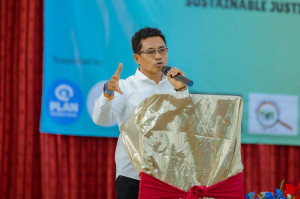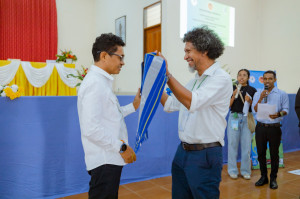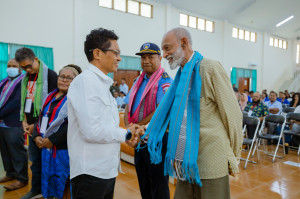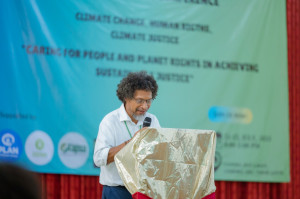The Vice Prime Minister and Minister Coordinator for Social Affairs, Mariano Assanami Sabino, took part as a speaker in the opening session of the International Conference on Climate Change, Human Rights and Climate Justice, which is taking place from July 21st to 23rd at the Canossa Hall in Dili. Organized by FONGTIL (Forum of Non-Governmental Organizations of Timor-Leste), in partnership with other organizations, the event brings together government representatives, academics and members of civil society from Timor-Leste and countries such as Brazil, Indonesia, the Democratic Republic of Congo, Fiji, Vanuatu, Australia, Thailand and the Philippines, with the aim of critically analyzing the interconnections between climate change, human rights and climate justice. 
In his speech, the Vice Prime Minister expressed his full support for the initiatives of Timorese civil society and defended the need for a joint effort to face the challenges posed by climate change, particularly in the region. “We all know that our old forests, where the guerrillas used to hide, have suffered destruction, so we need a policy that allows them to recover, but this requires everyone’s contribution, namely by planting new trees in areas at risk,” he said. 
Mariano Assanami Sabino also warned of the direct impacts of climate change on Timor-Leste, referring to intensified drought, water scarcity and soil erosion, and called for individual and collective responsibility in preserving the environment. “It is essential that everyone takes care of the environment, avoiding the burning of land and the indiscriminate cutting down of trees, as these attitudes represent a risk to people’s lives and their future,” he stressed. 
He also highlighted the measures already adopted by the Executive to preserve biodiversity, namely the conservation of protected areas such as the Nino Konis Santana Park, the Kay Rala Xanana Gusmão National Park, the Francisco Xavier do Amaral Botanical Garden and the Maukatar National Reserved Park. He also stressed that meetings like this can inspire concrete actions in defense of the oldest forests, which are essential for environmental balance and life. 
The conference, supported by organizations such as the HAK Association, Plan International, Oxfam, TAPSA, CGT-TL and DILICIOUS, advocates an inclusive and human rights-based response to guarantee climate justice, with a commitment to collective mobilization and the strengthening of transnational partnerships for a more sustainable and resilient society. END